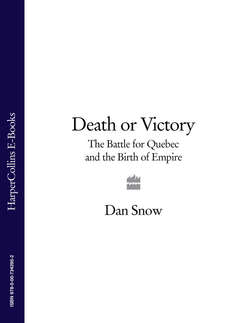Death or Victory: The Battle for Quebec and the Birth of Empire

Реклама. ООО «ЛитРес», ИНН: 7719571260.
Оглавление
Dan Snow. Death or Victory: The Battle for Quebec and the Birth of Empire
Death or Victory
DAN SNOW
Table of Contents
AUTHOR’S NOTE ‘One of the great battles of the world.’
PROLOGUE
ONE. Assault on New France
TWO ‘The enemy are out to destroy everything that calls itself Canada’
THREE. Mastering the St Lawrence
FOUR. Beachhead
FIVE. First Skirmishes
SIX. A New Kind of War
SEVEN ‘Trust me, they shall feel us’
EIGHT. Competing Ideas
NINE. Defeat at Montmorency
TEN ‘It is war of the worst shape’
ELEVEN ‘We find ourselves outnumbered and we fear, out generaled’
TWELVE ‘This man must finish with a great effort, and great thunder’
THIRTEEN. The Landings
FOURTEEN. The Battle of the Plains of Abraham
FIFTEEN ‘Our rejoicings are not yet over’
EPILOGUE
BIBLIOGRAPHY
Printed Original Materials
SECONDARY SOURCES. Books
Articles
Web resources
NOTES. Prologue
Chapter One: Assault on New France
Chapter Two: ‘The enemy are out to destroy everything that calls itself Canada’
Chapter Three: Mastering the St Lawrence
Chapter Four: Beachhead
Chapter Five: First Skirmishes
Chapter Six: A New Kind of War
Chapter Seven: ‘Trust me, they shall feel us’
Chapter Eight: Competing Ideas
Chapter Nine: Defeat at Montmorency
Chapter Ten: ‘It is war of the worst shape’
Chapter Eleven: ‘We find ourselves outnumbered and we fear, out generaled’
Chapter Twelve: ‘This man must finish with a great effort, and great thunder’
Chapter Thirteen: The Landings
Chapter Fourteen: The Battle of the Plains of Abraham
Chapter Fifteen: ‘Our rejoicings are not yet over’
Epilogue
INDEX
Copyright
About the Publisher
Отрывок из книги
THE BATTLE OF QUEBEC AND THE BIRTH OF EMPIRE
Title Page
.....
Wolfe is strangely inaccessible. He was certainly melodramatic, sensitive, and prone to self-pity. Many of his letters drip with disapproval for fellow officers and contain an almost puritanical adherence to duty. As a result he is often portrayed as aloof and uneasy among his peers, and yet there are hints of a more relaxed side to him. One officer under his command recorded that ‘his gestures [were] as open as those of an actor who feels no constraint’ and he displayed ‘a certain animation in the countenance and spirit in his manner that solicited attention and interested most people in his favour’.49 He certainly had a very loyal group of close friends. His attitude to the men under his command varied wildly depending on his mood and their performance in battle. But he was unwavering in his strong paternalism and the men in return seemed to harbour a genuine affection for their commander. He was certainly visible, his claims of physical infirmity are belied by his behaviour on campaign; he was always where the action was hottest and had the scars to prove it. He never shrank from the rigours of active service and it is possible that his maladies were exaggerated for effect.
His grandfather and father had both been soldiers. He was commissioned an officer aged 14, thanks to his father’s influence, first into the marines and then into an army regiment destined for service on the Continent. He tasted action for the first time at 16 against the French at the battle of Dettingen, where he caught the eye of a powerful patron, the 22-year-old Prince William Augustus, Duke of Cumberland, second and favourite son of King George II. With Cumberland’s support, plus his own impeccable family and social army network and his real talent, he ascended quickly through the ranks. He proved himself an excellent regimental commander; his battalions were disciplined and drilled to the highest standards that the army’s peacetime penury would allow. He also thought and wrote with genuine insight on tactics in the age of musket, bayonet, and cannon.
.....